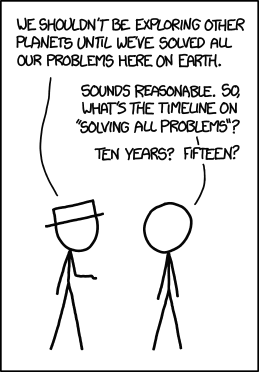how does the condensing every begin, and where can they meet up and find the focal point, and how does it even start up the inner core with the heat and magnetism. I'm still sensing the planets are artificially created by a gravitational device to combine the rocks together, and then a heat core like a small sun was purposely inserted to give the planet it's atmosphere? how does the pulling effect of the core make something so compact for a circular planet to even turn into one, and why is it perfectly rounded so perfectly?..... it's almost like a person woodworking through a wood project because on that day, he had wood.
The "condensing" begins because matter has mass, and a property of mass is gravity. Every atom has gravity, and absent of other forces will pull toward other atoms. In a large amount of empty space, these eventually condense to clouds of dust and gas, which pull together tighter and tighter until you have rocks and asteroids which after enough matter has been pulled in, begin to be affected by gravity even further - in the sense that everything greater than about 100km in diameter is round, because the gravity of that object pulls at the mass of it and shapes it around its center.
One of the more common equations for determining gravity is:
Fg=G*(m1*m2)/r2
Fg is the force of gravity (in newtons).
G is the gravitational constant. It's googlable, and I actually don't know it off the top of my head, just that it's about 20 orders of magnitude smaller than Coulomb's constant, which defines a similar formula, just for the electromagnetic force.
m1 and m2 are the mass of object 1 and the mass of object 2 respectively (in kilograms)
r is the distance between object 1 and object 2's centers of gravity (I believe in meters).
What it basically says is that the greater the mass, and the closer it is, the more gravitational force you will feel. (To answer one of your later questions, there's no outer limit to gravity - it just gets very very weak after a while.) Very large objects, such as planets or big asteroids, feel the force of their own gravity enough that it overcomes whatever force (in this case, the structural integrity [probably not the scientific term] of the object) is causing the object to resist its gravity.
Moving on to the heat that's generated within a planet, specifically Earth. Not every planet's core is hot, but Earth's is. If you search just about anywhere, you'll get varying answers in specificity, but all agree on three parts - that you have left over heat from the formation of the planet, in which it was mercilessly bombarded by asteroids and other massive objects - potentially a dwarf or proto planet which after impact put enough matter into Earth's orbit to slowly form the moon. These impacts generate an extraordinary amount of heat. Seriously. If I were to describe the cataclysmic effects of planet sized objects hitting each other in space, it would just sound like pure exaggeration. Do yourself the courtesy of looking that up on your own. So this heat remains on Earth and liquefies, well. Pretty much everything. As you may notice when you see oil on water, lower density liquids rise to the surface of a system, as higher density liquids sink. In the process of incredible quantities of molten rock and metal undergoing this rising and sinking, even more heat is generated - it's not a clean process. When you rub your hands together real fast, you'll notice it generates heat. By that same process, gargantuan masses of iron and rock sliding past each other generates even more heat - this is the second part, and when everything "settles" that heat remains trapped under hundreds and thousands of miles of Earth, and similar to how your house traps in heat, the heat inside the Earth has a hard time escaping. There's a third factor that seems largely responsible for the sustained heat - Earth's mantle and core not really cooling off as it should have, and that's radioactive decay. Radioactive elements are atoms that are unstable and emit energy as they decay toward a more stable state. As you might know, temperature is a measure of heat, which is actually synonymous with kinetic energy. As a result of the release of energy that has basically nowhere to go, it bumps around other atoms and keeps them moving which keeps them hot. As this continues, hotter clusters of elements, just like hot air, rise and cooler clusters fall, and back to the second source of heat, the one about rubbing your hands together, more friction is generated, and more heat happens.
Alright. So that's why the center of the Earth is hot - but that's not why stars are hot (at least not the primary reason).
Stars coalesce in much the same way that planets do - through gravitational attraction. Now let's back up for just a moment - 13.8 billion years to be specific. This is the start of the universe. You may be familiar with terms like "proton" "electron" and "neutron" and you may know well enough to associate them with atoms. Now, I'm going to skip a hell of a lot of physics right here, because it's not what you asked for. What you need to know is that protons have a lot more mass than electrons (like a planet has more mass than a blueberry), and protons are positively charged and electrons are negatively charged. Furthermore, they have the same amount of charge, meaning that a proton plus an electron makes zero total charge. Additionally, neutrons aren't yet in the picture.
Beginning of the universe - skipping the real nitty gritty subatomic stuff, in a fraction of the smallest fraction of a second you can imagine, there is a universe full of protons and electrons. You may have heard the term opposites attract - and this is where that's from. Very quickly, electrons and protons pair up and form the simplest and smallest element, Hydrogen. That's just one proton, and one electron. There are also hydrogen ions, which are protons that don't have electrons, and free electrons, which are electrons without protons - but for the must part you have hydrogen. A universe of it.
You might know that hydrogen is a gas at most temperatures - think Hindenburg - and here it's no different (well actually it's plasma for a significant period, but that's a story for another day). These tiny tiny tiny little particles of hydrogen slowly start to come together and form large clouds of gas. Fast forward a billion years or so. Eventually you have a cloud of hydrogen large enough (and they are large - much larger than your usual star) that it starts pulling really really hard on itself - just like planets. As the hydrogen starts to collapse, it releases energy. Think how when you fall, you have to move, and that movement takes energy. That energy comes from you basically standing up and putting yourself at a higher point. When you fall, that energy is released, and some of it is absorbed by the air that you knock out of the way, and when you hit the ground, that energy is absorbed by both you and the ground, while some of it is released in the form of heat and sound. In much the same way, that falling hydrogen releases energy, and it is absorbed by more and more hydrogen.
Now remember when I said that protons are positively charged? Well, for their volume, they are the most positively charged particles in the known universe. If opposites attract, then two of a kind repel - and protons repel each other at close range at a really extreme force. So, like we had the formula for gravity, we have the formula for electromagnetic attraction and repulsion:
Fe=K*(q1*q2)/r2
Look familiar? I copied and pasted it from above and then just switched some symbols for a few variables.
Fg=G*(m1*m2)/r2
Instead of mass, q stands for charge. Instead of gravitational force, Fe stands for electromagnetic force, and instead of the gravitational constant, we have Coulomb's constant, K. Now one of the big differences here is that if Fe is positive, the force is repulsive, as in it pushes the two objects apart. If it's negative, it attracts. If we're talking about two protons here, Fe will always be positive, and therefore they will repel. That's boring. Sorry. What's really important is the difference between K and G. If we say G is 1 (it's not, but nicer than saying "x") then K is about 100,000,000,000,000,000,000. That's 20 zeros, and we would call it "100 quintillion". That means that the force of repulsion between two protons is about 100 quintillion times stronger than their gravitational attraction. Honestly we'd have to add or subtract a few zeros, because a proton doesn't equal a single unit of charge or mass, but it repels with an incredible force and will always always always beat out gravity.
Until it doesn't.
The combined pressure and energy of that massive cloud of gas collapsing is enough to break that force, and get protons to touch. This is where things get real interesting. When two protons touch, they undergo something called nuclear fusion. You might have heard about that - you probably heard about it in reference to weapons, particularly "The Hydrogen Bomb". Well think bigger. Because here, the environment is just right, that instead of a tiny little bit of hydrogen fusing, as it does in the very largest of atomic weapons, a mass bigger than a planet undergoes fusion. A star is literally an incredibly high amount of matter constantly exploding in the same way as our most powerful of nuclear warheads do, every single second for billions and billions of years, and turning into new elements - namely helium (which has two protons, which makes sense because duh). The only thing that holds stars together is their absolutely immense gravity.
So that's why things are hot.
Edited by ticklemyiguana, 04 February 2016 - 09:09 PM.
 Sign In
Sign In Create Account
Create Account





 Back to top
Back to top












































